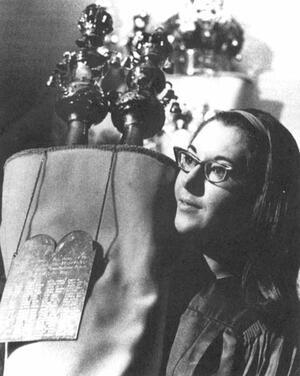On Not Going to Rabbinical School
This photograph was taken in 1972, when Sally Jane Priesand became the first woman in the United States to be ordained as a rabbi. She faced many challenges on the road to acceptance. But she continued to struggle to carve a place for herself—and for all women—within the panoramic diversity of Judaism.
Institution: The Jacob Rader Marcus Center of the American Jewish Archives, Cincinnati, OH, www.americanjewisharchives.org and Garrett Cope, Citizen Patriot, Jackson, MI
In this fifth piece from our Reimagining 'Rabbi' series, writer Chanel Dubofsky responds to this clip:
Let's be clear: I did not make it to the application process for rabbinical school. I didn't even request an application. I came close, but luckily, before I did anything, I managed to figure out the difference between a calling and an impulse. In this case, I probably should have felt a little more called to actually engage with the Torah, instead of hoping that my ambivalence would resolve itself. (Update: it has not.)
In her video, Sally Preisand says that women aren't taken into consideration when it comes to the leadership of large congregations, and many women don't have the desire for it. Women, she offers, see success differently. While the traditional definition of success in a Jewish communal context such as the rabbinate once meant (and for many still mean) getting the largest congregation possible, Preisand has learned that success doesn't necessarily mean bigger––it means doing better from day to day.
The idea of being the rabbi of a giant suburban congregation was always fully repellant to me––I am not the person I imagined I'd have to pretend to be to get that job: someone interested in getting married and having kids, someone who swore less, and owned clothing that could qualify––even remotely––as business casual. I was not willing to distort myself into that person, especially to do something that actually filled me with dread and claustrophobia, and I also wasn't willing to do the work necessary to change those institutions from the inside. Instead, what I thought I'd do in the rabbinate was what I'd already been doing for years––hanging out with college students and talking about Judaism and progressive politics. But somehow I never got to the point where I could see that work as that of ‘a successful Rabbinate’.
I'm wondering now, after listening to Preisand, if I wasn't giving too much attention to my own fear. Did I reject the whole game––the rabbinate, the hunt for the right congregation––before it could reject me? In addition to not being that into the Torah, did I also not believe enough in my own ability to succeed as a Rabbi?
I spent years in Jewish communal scenarios that required me to determine the number of people in a room, and was cognizant that that number dictated whether or not the event had been successful. It is an exhausting manner of assessment (especially if, like me, you never get better at estimating how many people are in a room), and frankly, an inadequate one. The spaces in which I feel the most powerful as a leader are the small ones, the groups of 15 or even fewer, where a conversation is not only possible, but the best way to move forward together. That bringing of people together is what success has always meant for me.
This approach, focused as it is on smaller communities, feels the most organic, but is that because I've internalized the notion that as a woman, I can't be taken seriously in a larger space, that I can't lead an enormous congregation? Have I convinced myself I can't do more, or have I rejected a patriarchal idea of success and shifted the concept of what ‘more’ means?
On some level, it doesn’t matter. I’m not going to rabbinical school either way. But I do think it matters to interrogate our instincts, to discern when we have internalized misogynistic messages that are keeping us from success, and when we are redefining what it means to succeed.
I think this is especially true now, when, as feminists, we have to figure out what it means to successfully navigate and resist in Trumpland, a place intent on rendering women, queers, people of color, and everyone who isn't a white man silent and neutered. We have to continue––or begin––examining our motivations in our activism, so we can keep pushing ahead in the most effective way possible.
In this challenging time, it is more crucial than ever that we not contort ourselves into boxes to fit definitions of success that were made by men and for men. We must continue to challenge ourselves to expand our thinking about what successful leadership looks like, and to grow in that leadership. We must remember that, sometimes, the biggest wins can happen in the smallest rooms.
It is going to take every kind of leader to get us out of this mess, even–– and maybe especially––those of us who preach best to small congregations.
Love Chanel's reflection? Want to stay up to date on our weekly Reimagining ‘Rabbi’ series? Let us know!







